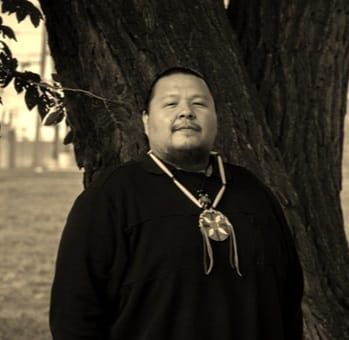September is National Recovery Month

Austin Sunka Luta (Cheyenne River Lakota) has 14 years of being clean and sober by traveling the Red Road to Recovery. (photo courtesy of Austin Sunka Luta)
EAGLE BUTTE SD – September is National Recovery Month, according to the federal Substance Abuse Mental Health Services Administration (SAMHSA). Since 1989, the national observance has been held every September to promote and support new evidence-based treatment and recovery practices, the nation’s strong and proud recovery community, and the dedication of service providers and communities who make recovery in all its forms possible.
Austin Sunka Luta (Cheyenne River Lakota) has been clean and sober for the past 14 years. He struggled with substance use and abuse in his teens, tried to quit using on his own, and even sought help from professional treatment services, including a 90-day residential treatment program in his early twenties.
He gives credit to his leksi Leon Red Dog for teaching and showing him how to heal. Uncle Leon was a recovering alcoholic, a veteran, and an alcohol and addiction counselor. He taught Austin how to recover by practicing traditional prayer, by ceremonies, and by identifying with and embracing his culture and making a personal connection with his Higher Power, which Austin prefers to call Taku wakan Skanskan (something sacred that’s moving). This pathway is sometimes called “the Red Road to recovery.”
Sunka Luta says this pathway to recovery does not work for everyone, but “for me, it has opened up the door for me to live life the way it’s supposed to be — a life of integrity, woksape (wisdom with respect), wocekiya (prayer), waunsila (compassion). … (This pathway) has taught me to stay balanced, how to be a good relative living in two worlds – the Lakota world and the modern-day materialistic, capitalistic oligarchy. …My life today has a foundation of healing.”
“Studies have shown that cultural identity and spirituality are important issues for Native Americans seeking help for substance abuse, and these individuals may experience better outcomes when traditional healing approaches (such as powwows, drum circles, and sweat lodges) are incorporated into treatment programs,” according to a scholarly article published in the professional journal Psychiatric Services.
Sunka Luta would say to anyone considering a recovery pathway, “Go to a place where there is running water, like a river. Take some alone time for yourself. Sit and think and connect to your nagi (Higher Power or Spirit, sometimes known as intutition or “gut instinct”). Listen for guidance.”
To those who may be worried or concerned about a relative’s substance use or mental health, Sunka Luta says, “Be non-judgmental and patient. Show unconditional pure love, even if it’s tough love. Go inside and find the Light within yourself and show that Light to the one who is struggling.”
SAMSHA offers a free “Recovery Month Toolkit” and notes, “With the right treatment, support, and resources, recovery is possible for everyone. Use this Toolkit to learn more about what SAMHSA is doing to support people in recovery and how to share this information with your audiences. Together, we can make a difference in the lives of those in or seeking recovery from mental and substance use disorders.” Readers can access the Toolkit at tinyurl.com/5n8zfey5 .
The Tool Kit includes:
- Social media content to help spread awareness about the process of recovery and to share the hopeful message that most people who get help do recover.
- Resources for learning about and supporting those in recovery.
- Promotional materials about recovery in September and beyond.
All materials for the Tool Kit are designed to be shared with diverse audiences and across media channels. Tool Kit materials are downloadable and shareable and some of the material is customizable.
SAMSHA encourages Tool Kit users to copy, download, and share the social messages, graphics, and promotional materials in ways that fit the needs of local audiences and channels. Also, SAMSHA suggests, “Use our tools in tandem with the best practices with your communities and networks.”
SAMHSA also offers a free, downloadable document titled, “Recovery from Substance Use and Mental Health Problems Among Adults in the United States.” This brief report presents personal narratives of recovery among adults aged 18 and older in the United States who thought they ever had a problem with their use of drugs or alcohol and/or mental health. These findings provide a clearer characterization of the factors associated with recovery among adults and how future efforts can foster a whole-health approach to sustain recovery from mental health and substance use conditions. Access the report at tinyurl.com/3sdtd2zh .
(Contact Grace Terry at graceterrywilliams@gmail.com)
#####
SOURCES:
Personal interview and correspondence with Austin Sunka Luta
Beals, J., Novins, D.K., Spicer, P., Whitesell, N.R., Mitchell, C.M., Manson, S.M., & American Indian Service Utilization, Psychiatric Epidemiology, Risk, and Protective Factors Project Team. (2006). Help seeking for substance use problems in two American Indian reservation populations. Psychiatric Services, 57(4), 512–520.
americanaddictioncenters.org/addiction-statistics/native-americans
The post September is National Recovery Month first appeared on Native Sun News Today.
